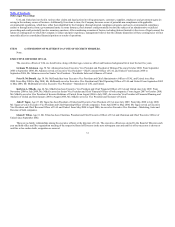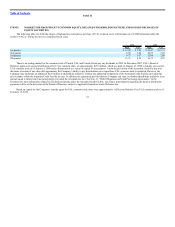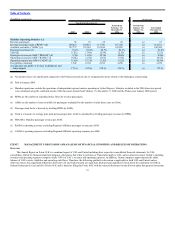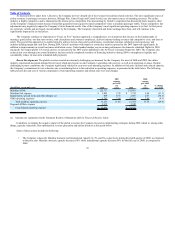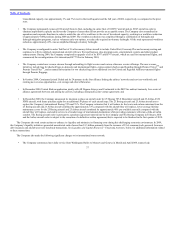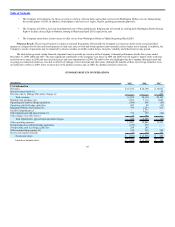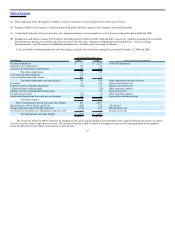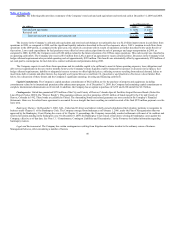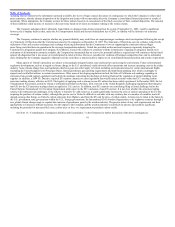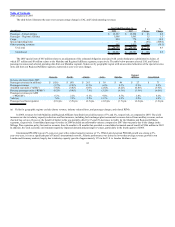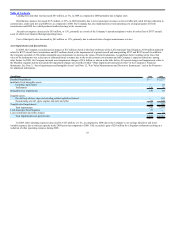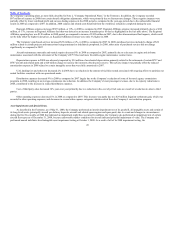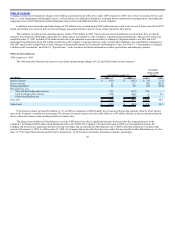United Airlines 2009 Annual Report Download - page 45
Download and view the complete annual report
Please find page 45 of the 2009 United Airlines annual report below. You can navigate through the pages in the report by either clicking on the pages listed below, or by using the keyword search tool below to find specific information within the annual report.
Table of Contents
including (but not limited to) the information currently available, the views of legal counsel, the nature of contingencies to which the Company is subject and
prior experience, that the ultimate disposition of the litigation and claims will not materially affect the Company’s consolidated financial position or results of
operations. When appropriate, the Company accrues for these matters based on its assessments of the likely outcomes of their eventual disposition. The amounts
of these liabilities could increase or decrease in the near term, based on revisions to estimates relating to the various claims.
The Company anticipates that if ultimately found liable, its damages from claims arising from the events of September 11, 2001, could be significant;
however, the Company believes that, under the Air Transportation Safety and System Stabilization Act of 2001, its liability will be limited to its insurance
coverage.
The Company continues to analyze whether any potential liability may result from air cargo/passenger surcharge cartel investigations following the receipt
of a Statement of Objections that the Commission issued to 26 companies on December 18, 2007. The Statement of Objections sets out evidence related to the
utilization of fuel and security surcharges and exchange of pricing information that the Commission views as supporting the conclusion that an illegal
price-fixing cartel had been in operation in the air cargo transportation industry. United has provided written and oral responses vigorously disputing the
Commission’s allegations against the Company. Nevertheless, United will continue to cooperate with the Commission’s ongoing investigation. Based on its
evaluation of all information currently available, the Company has determined that no reserve for potential liability is required and will continue to defend itself
against all allegations that it was aware of or participated in cartel activities. However, penalties for violation of European competition laws can be substantial
and a finding that the Company engaged in improper activity could have a material adverse impact on its consolidated financial position and results of operations.
Many aspects of United’s operations are subject to increasingly stringent federal, state and local laws protecting the environment. Future environmental
regulatory developments, such as in regard to climate change in the U.S. and abroad, could adversely affect operations and increase operating costs in the airline
industry. Some climate change laws and regulations that have gone into effect apply to United, including environmental taxes for certain international flights
(including the United Kingdom’s Air Passenger Duty), limited greenhouse gas reporting requirements and land-based planning laws which could apply to
airports and could affect airlines in certain circumstances. Other areas of developing regulations include the State of California rule-makings regarding air
emissions from ground support equipment and federal rule-makings concerning the discharge of deicing fluid and the regulation of aircraft drinking water
supplies. In addition, a 2009 EU Directive required EU member countries to enact legislation that would include aviation within the EU’s existing carbon
emissions trading scheme, effective in 2012. The legality of applying such a scheme to non-EU airlines has been widely questioned. In December 2009, the Air
Transportation Association, joined by United, Continental and American Airlines, filed a lawsuit in the United Kingdom challenging regulations that transpose
into UK law the EU emissions trading scheme as applied to U.S. carriers. In addition, non-EU countries are considering filing a formal challenge before the
United Nations’ International Civil Aviation Organization with respect to the EU’s inclusion of non-EU carriers. It is not clear whether the emissions trading
scheme will withstand such challenges. If the scheme is found to be valid, however, it could significantly increase the costs of carriers operating in the EU (by
requiring the purchase of carbon credits), although the precise cost to United is difficult to calculate with any certainty due to a number of variables, and will
depend, among other things, on United’s carbon emissions from flights to and from the EU and the price of carbon credits. Actions may be taken in the future by
the U.S. government, state governments within the U.S., foreign governments, the International Civil Aviation Organization, or by signatory countries through a
new global climate change treaty to regulate the emission of greenhouse gases by the aviation industry. The precise nature of any such requirements and their
applicability to United are difficult to predict, but the impact to the Company and the aviation industry would likely be adverse and could be significant,
including the potential for increased fuel costs, carbon taxes or fees, or a requirement to purchase carbon credits.
See Note 13, “Commitments, Contingent Liabilities and Uncertainties,” in the Footnotes for further discussion of the above contingencies.
41


